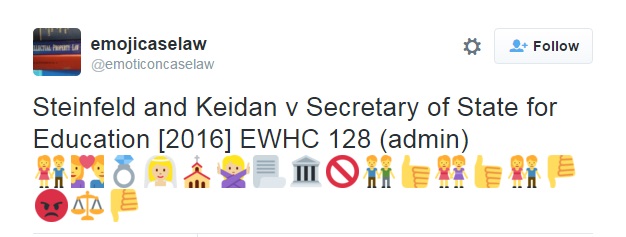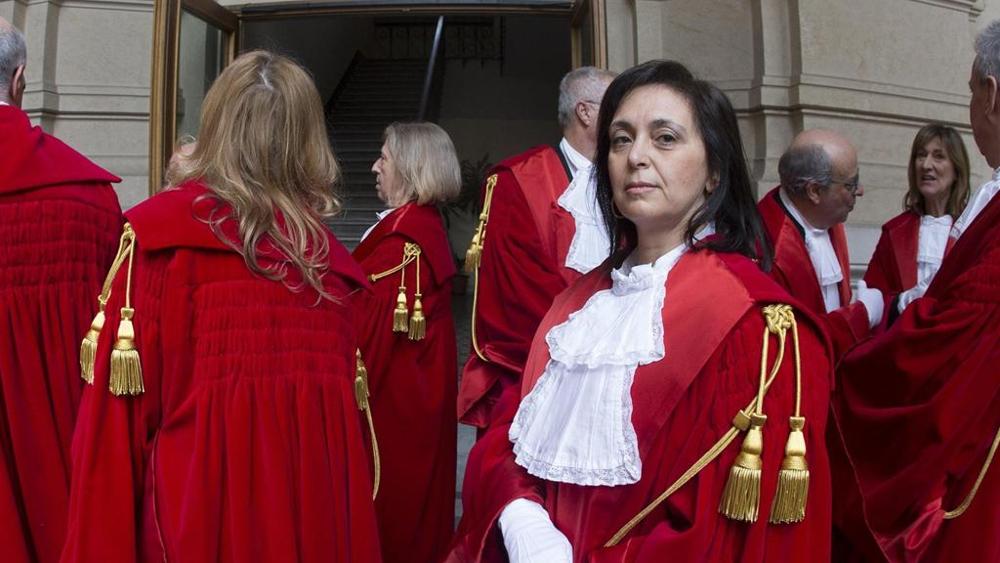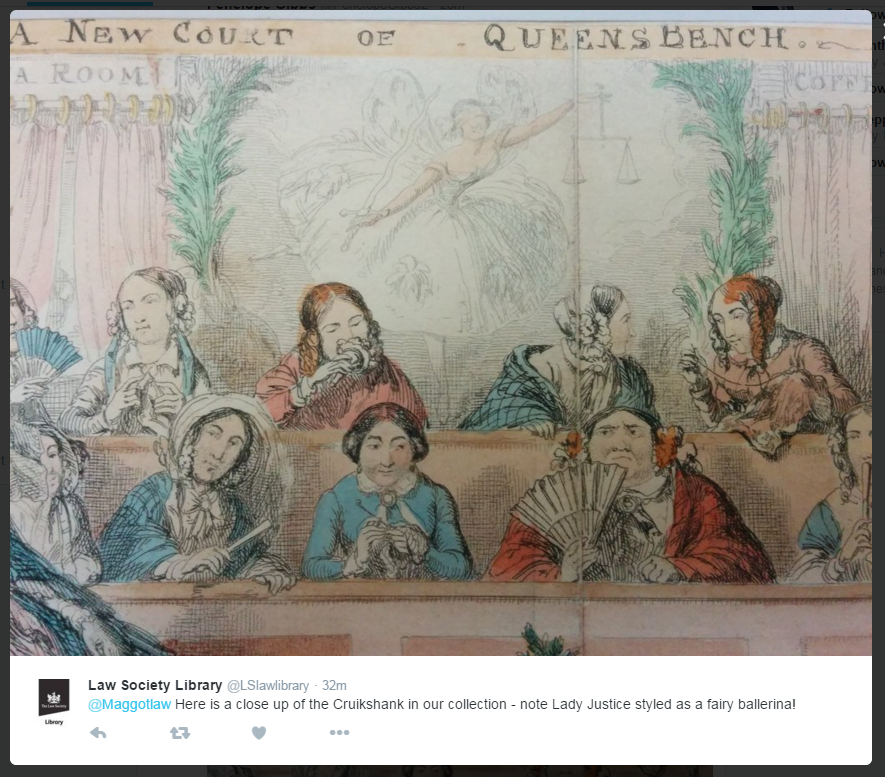Weekly Notes: legal news from ICLR – 29 January 2016
This week’s roundup of legal news and commentary includes Lord Chancellor’s legal aid U-turn, a parliamentary look at the court fees hike, a welcome piloting of transparency in the Court of Protection, and some good and bad news on diversity. Criminal Legal Aid Gove’s dramatic U-turn poses question And the question is: what next?
This week’s roundup of legal news and commentary includes Lord Chancellor’s legal aid U-turn, a parliamentary look at the court fees hike, a welcome piloting of transparency in the Court of Protection, and some good and bad news on diversity.
Criminal Legal Aid
 Gove’s dramatic U-turn poses question
Gove’s dramatic U-turn poses question
And the question is: what next? The Lord Chancellor Michael Gove has already u-turned a number of policies introduced by his predecessor, Chris Grayling, including the so-called prisoner book ban, the commercial venture Just Solutions International set up to sell penal knowhow to foreign governments (which the National Audit Office recently reported had made a loss of over £1m), and the Criminal Courts Charge. Now he has reversed the latest 8.75 per cent cut in criminal legal aid fees for solicitors and abandoned plans, which were already the subject of a growing number of court claims, for reallocation of “duty provider contracts” in respect of police station work to a much reduced number of providers.
The Times (Law Brief) reports that
The Ministry of Justice has in part bowed to robust opposition – solicitors and barristers mounted a series of strikes in protest against the reforms – and postponed the second tranche of fee cuts for at least a year. In April, fees will be restored to their pre-July2015 levels. Gove also announced that controversial reforms to criminal legal aid contracts for law firms, which were designed significantly to reduce the number of practices offering state-funded services, will be ditched completely.
But the question “what next” also applies to legal aid itself. The Chancellor (of the Exchequer) is not going to let the (Lord) Chancellor spend what isn’t in the kitty, so expect to see fresh proposals for slashing the justice budget. The money will have to come from somewhere, including the £750m promised for upgrading (or perhaps just installing) courtroom IT, which was supposed to come from selling off under-used court buildings. This week it was disclosed that 15 such buildings remain unsold while a fresh tranche is due to come on what looks like a saturated market. Back in September 2013 the Gazette reportedthat 44 of the 142 buildings that were earmarked for closure in December 2010 remained unsold at that time. This month, the MOJ admitted that 15 court buildings still remain unsold, with a further round of sales (intended to pay for the IT revolution) in the offing. Despite this, Gove asserts that there are “economies I have made elsewhere in my department” enabling him to justify the legal aid U-turn.
LATE ADDITION:
- The National Audit Office have now been asked, by shadow Lord Chancellor Lord Falconer, to investigate the sums wasted on the scrapped criminal legal aid proposals, as reported by Solicitors Journal.
- A copy of Falconer’s letter was scooped by the indefatigable David Allen Green on his Jack of Kent blog. The letter is a chronicle of a disaster foretold.
- Also: a good roundup of this month’s legal aid news from the Young Legal Aid Lawyers blog.
Court Fees
Justice Committee hears evidence
The Justice Committee’s Courts and tribunals fees and charges inquiry heard oral evidence at a session on 26 January from Lord Dyson, Master of the Rolls, Sir James Munby, President of the Family Division, and Sir Ernest Ryder, Senior President of Tribunals. Lord Dyson said that while he accepted that
the principle of having court fees to make a contribution, at any rate, to the cost of running the system is now pretty well established”, he felt “the real area for debate is the level, to make sure that whatever the level is, it does not in any way impair access to justice.”
However, the idea that civil justice should be subsidising the family and criminal courts was “wrong in principle”. Moreover “the research that was done by the Government before they embarked on this course was lamentable, frankly”. (It consisted of making a few phone calls.)
Although it was possible for qualifying poorer litigants to get a rebate on fees, Sir James Munby pointed out that
The general level of provision of information for litigants in person, whether in relation to the system or in relation to fee remission, is woefully inadequate.”
He highlighted a key problem for ordinary litigants (regardless of fees) (and one which most of us give too little thought to, though it is an important aspect of open justice and transparency:
What lawyers do not understand is that the kind of language lawyers use, even if lawyers think it is ordinary English, is not ordinary English in the sense in which the man or woman in the street would recognise it. Therefore, the task of getting this material into a form that ordinary people understand is very difficult.”
As to fees for commercial litigation, Lord Dyson touched on a point which I myself was discussing recently with a shipping lawyer from Hong Kong, namely the competitiveness of the English courts compared with other forums in which international commercial disputes could be determined. Lord Dyson pointed out that “anything that makes Singapore more attractive and London less attractive is something to be very concerned about.” But as I discovered, it is not just Singapore. There are lots of places in the world where, even if the contract has a London jurisdiction clause, lawyers on both sides will agree to resolve any dispute somewhere more cost-efficient and, perhaps even, convenient. So the value of English law as a governing law will wane, and the development of the English common law will suffer, for the sake of a Scrooge-like principle that regards the civil justice system as a cash cow.
Court of Protection
Will transparency increase public understanding?
Given that all the main media reports about the Court of Protection’s pilot scheme to “open its doors to the public” from 29 January have fallen into the error of describing parties lacking capacity as being “sick” and “vulnerable”, this remains open to question. In one recent case, media reports invented a wholly fictitious “right to die” in order to say the court had granted it to someone when in fact it simply said they had capacity to make a decision about their own treatment and whether it should cease. Barbara Rich has written about this in Solicitors Journal (Read all about it: Incompetent reports on the CoP). Her article should be essential reading for anyone planning to attend and report CoP hearings during the pilot period.
Mis-reporting of Family Court cases also often involves using wrong or out-of-date terminology (such as “custody battle”) which suggests a culture of over-simplification and perhaps an unwillingness to recognise subtle distinctions or categories. Despite this risk, badly described sunlight is still better than no sunlight at all, when it comes to disinfecting public ignorance about the work of the law courts and cleaning the windows into open justice.
The Judiciary website announcement said:
The Practice Direction will effectively change the default position to one where hearings are held in public with reporting restrictions to protect identities. This means that when an order has been made under the pilot, both the media and the public will be able to attend, unless a further order has been made which excludes them. This will also apply to proceedings issued pre-29 January but where a further hearing becomes necessary after the start date.
The specialist Court makes decisions about the personal welfare (e.g. medical treatment) and the property and affairs of persons who lack capacity to make them themselves, applying a best interests test. The Court of Protection’s main base is in London but it also sits throughout England and Wales.
Court of Protection judgments have been routinely published since 2010 and serious medical cases (such as a decision to stop life support) are held in public, with the identities of those concerned kept anonymous. Committal hearings where a custodial sentence is imposed are also held in public.
Her Majesty’s Courts and Tribunals Service (HMCTS) is also amending the way in which court lists are displayed, so that they provide a short descriptor of what the case is about, allowing the media and members of the public to make an informed decision on whether to attend the hearing. Lists will be published on a weekly basis in court buildings and online at www.courtserve.net.
You can locate the courts themselves using this interactive map (works best on Firefox apparently).
Parish notices
BSB report on diversity at the Bar
The Bar Standards Board, which regulates barristers, has published its latest report on diversity at the Bar. The data relied on suggests that there basically isn’t nearly as much diversity as there should be (and is in other professions, or even other branches of the legal profession, such as solicitors) which is bad for law, bad for the judiciary (since judges are mostly drawn from the ranks of the senior Bar) and bad for the development of the common law (because it is based on decisions by judges drawn from too narrow a range of intellectual hinterlands).
The response rate on questions such as gender and race were better than in the past, but on a number of characteristics the response rate was a bit woeful. Between 69 and 75 per cent of respondents did not disclose things like sexual orientation, religion, disability status, caring responsibility or socio-economic background (eg what school they went to, or whether they were first generation university students). Presumably the barristers filling in these questionnaires thought the questions impertinent or pointless, though few (around 2 per cent) availed themselves of the option “prefer not to say”. Perhaps there is a tension between focussing on merit and focussing on entitlement which surveys like this need to prove they are resolving rather than perpetuating.
Read the 2015 report (PDF)
Dates and Deadlines
LegalVoice conference
When: Tuesday 1 March 2016
Where: Freshfields Bruckhaus Deringer, 65 Fleet St, London EC4Y 1HS
Keep an eye on www.legalvoice.org.uk for the programme and booking details.
The CPS – Is the System Working?
Politeia forum discussion with Lord Ken Macdonald (Former DPP, 2003-08), Victoria Atkins MP ( Home Affairs Select Committee) and Oliver Sells QC (5 Paper Buildings).
Tuesday 23rd February, 7 – 8 pm at BPP Law School (Room 3.07), 68-70 Red Lion Street, London, WC1R 4NY
If you would like to attend please email Secretary2@politeia.co.uk with your name, organisation, position and day time contact number.
Law reporting
Holy Emoji! – or Is the traditional headnote dead?

Law (and injustice) around the world
Egypt
Poet jailed for “insulting Islam”
According to the Arabic Literature (in English) blog, Egyptian poet Fatima Naoot was sentenced this week to three years in prison and a 20,000LE fine, after being found guilty of “contempt of religion” by reason of a Facebook post from October 2014 in which she descried Eid Al-Adha’s tradition of slaughtering sheep as the “greatest massacre committed by human beings.” Naoot was convicted under a provision (Article 98), which makes it an offence to
“[exploit] religion in order to promote extremist ideologies by word of mouth, in writing or in any other manner, with a view to stirring up sedition, disparaging, or contempt of any divine religion or its adherents, or prejudicing national unity…”
The conviction comes just two weeks before a retrial for novelist Ahmed Naji and editor Tarek al-Taher, charged with offending public morals.
Ghana
Corruption unravels all
Last month, the Judicial Council of Ghana unanimously decided to remove from office 20 out of the 21 Judges and Magistrates cited in a petition brought by an investigative journalist, supported with evidence showing them taking bribes to subvert justice. Now some of the judges are suing the Chief Justice and the petitioners, seeking to prevent their dismissal. If they remain in office, though, who will trust them to administer justice now? And what will it say about the rest of the Ghanaian justice system? And what will become of all their existing judgments: there has been talk of reopening all the cases, but there are questions of double jeopardy, too. What would be fairest for the parties now? These and other knotty issues are discussed in post on the Fair Trials blog by Muheeb Saeed, a Programme Officer at the Media Foundation for West Africa (MFWA)
.
Italy
Judicial diversity welcomed
If judicial diversity in the UK seems to advance at the rate of sprinting through treacle, we should take heart at the news from Italy, where the treacle seems to have been replaced with olive oil. A report in The Guardian this week announces that Female Italian judges outnumber male counterparts for first time.
Until 50 years ago, when the qualifying exam was first opened to women, they were deemed unsuitable for the “difficult art of judging” because they lacked balance “for physiological reasons”.
Citing a report by the country’s Attorney General, the Guardian says: “The annual report noted that the genders had already been close to parity, but that 2015 marked the first time women were dominant.” A better way of putting that last word might have been “more numerous”, but this is the Guardian. It could have been worse. A report in an Italian newspaper (La Stampa) referred to “le donne in toga” (women in togas) – a seemingly colourblind reference to their smart red gowns (depicted).

LATE ADDITION
At least today’s views on female judges are not quite as archaic as those of the satirical cartoonist George Cruickshank, who died on 1 February in 1878. The Law Society tweeted the following cartoon of his, “showing what he thought a court might look like with women in charge!”
That’s it for now. My thanks to all who led me to stories, mostly my followees on Twitter.
This post was written by Paul Magrath, Head of Product Development and Online Content at ICLR, who also tweets as @maggotlaw. It does not necessarily represent the opinions of ICLR as an organisation. Comments welcome on Twitter @TheICLR.
